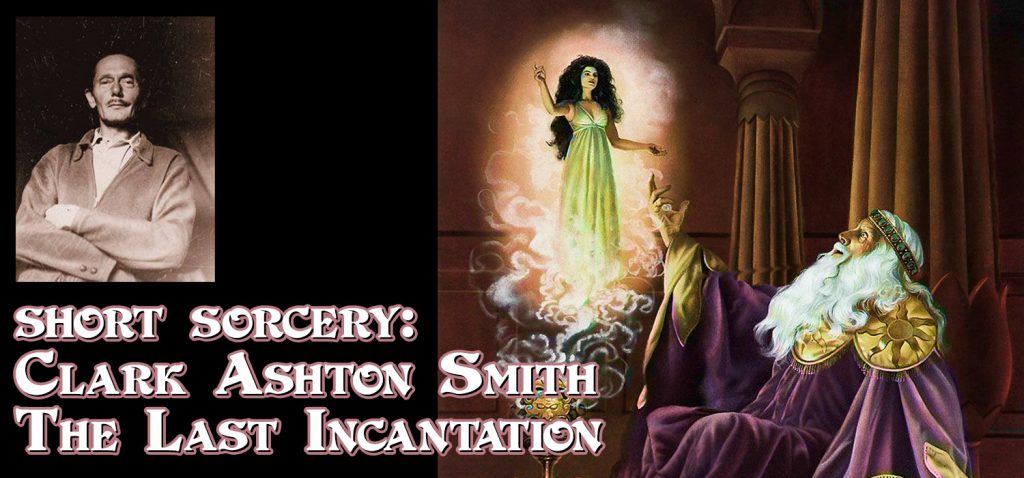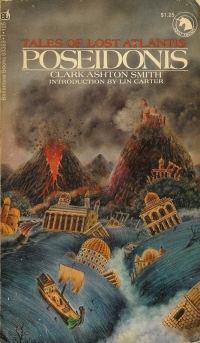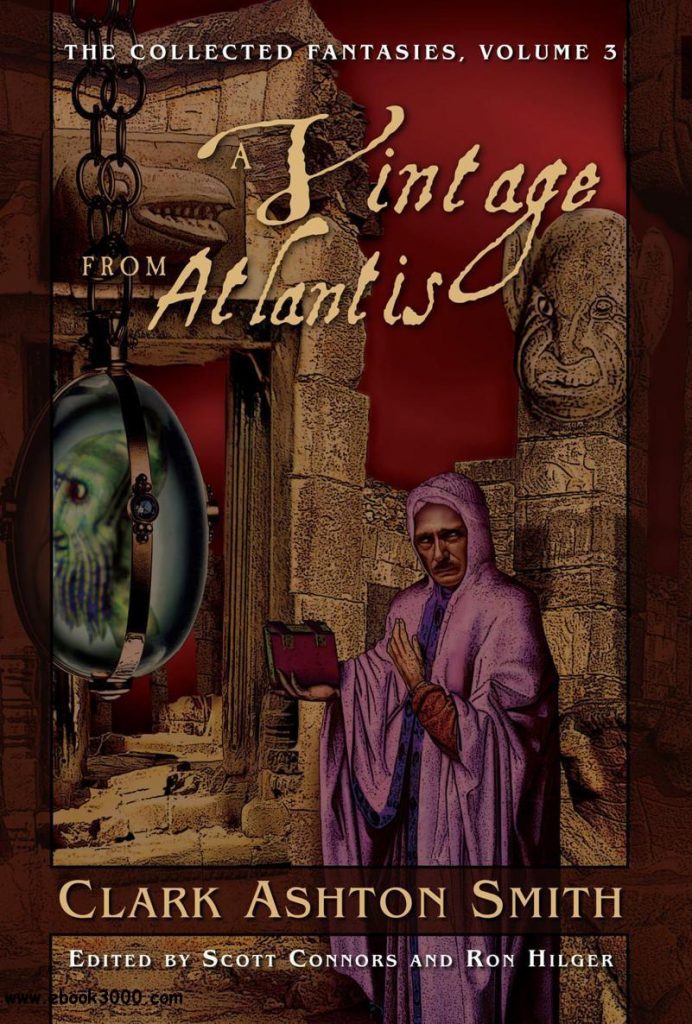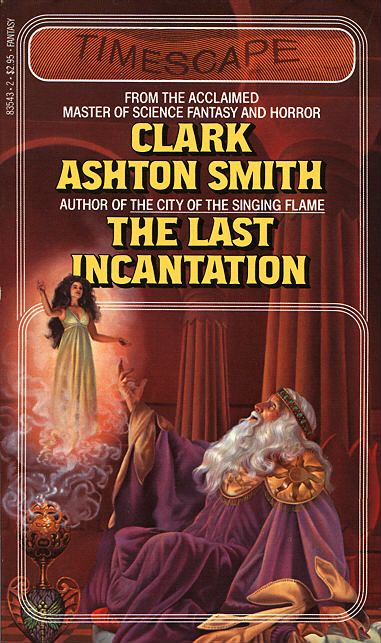
Short Sorcery: Clark Ashton Smith’s “The Last Incantation”
by Bill Ward
Clark Ashton Smith’s first great literary love, his calling even, was poetry. His artistic inclinations, the themes and images that fired his blood, were for the fantastical, the mythic, and the wildly imaginative. But fever dreams of baroque lands and sinister sorcery were fast becoming passe among the literary mainstream of his time, and so the unconstrained dreamers of Smith’s day found themselves slinging wild tales in the pulps. Smith himself would forever “refuse to submit to the arid, earth-bound spirit of the time.”
And so the imaginative poet transformed into the poetic imaginer of fantasy short stories. Some of Smith’s tales resemble the more typical Weird Tales style of story, but many are something else entirely. A sometime writer of prose poems – ultra short stories of metrically precise concision – Smith’s attention to language and form in his work was as refined as it was ubiquitous. His classic “The Last Incantation” is itself nearly a prose poem, clocking in at just under 2,000 very carefully chosen words.

“Malygris the magician sat in the topmost room of his tower that was builded on a conical hill above the heart of Susran, capital of Poseidonis. Wrought of a dark stone mined from deep in the earth, perdurable and hard as the fabled adamant, this tower loomed above all others, and flung its shadow far on the roofs and domes of the city, even as the sinister power of Malygris had thrown its darkness on the minds of men.”
Here the single scene of the story opens, in senescent Poseidonis, last remnant of doomed Atlantis. Already the reader is made to feel that it is an ancient place, the archaic rhythms of the King James Bible rolling through a land with place names that would not be out of place in Pausanias or A Thousand and One Nights. We glimpse the preeminence of Malygris, and his evil. But, most especially, his static, immovable, obduracy.
“Now Malygris was old, and all the baleful might of his enchantments, all the dreadful or curious demons under his control, all the fear that he had wrought in the hearts of kings and prelates, were no longer enough to assuage the black ennui of his days.” The invincible, unchallengable magician reigns utterly supreme, having vanquished all foes, subverted all limits natural or supernatural, learned all things knowable and wielded every power. All that is left to him is the contemplation of his own dead soul, and so he sits in a runic throne of mastodon-ivory, unassailable in the mightiest tower of the land – and is every bit as much a prisoner as those who dwell in his malignant shadow.
Smith treats us to a glimpse of the necromancer’s environs, painting a vivid picture in one of those specifically-observed tour de force passages of detailed imagination that seem to come as naturally to him as breathing. Thus Malygris surrounds himself with “the skulls of men and monsters; phials filled with black or amber liquids, whose sacrilegious use was known to none but himself; little drums of vulture-skin, and crotali made from the bones and teeth of the cockodrill … Books were piled everywhere: ancient volumes bound in serpent-skin, with verdigris-eaten clasps, that held the frightful lore of Atlantis, the pentacles that have power upon the demons of the earth and the moon.” But his presence is an immensely still one, “Immovable he sat, implacable he mused.” If not for the animating presence of his thoughts, he would appear a corpse or statue.

Exploration of his own dim past finally yields fruit, and the being of adamant experiences flushes of his own near-dead humanity. After considering his years “…so full of gold and splendor, the days of triumph that were colored like a soaring flame, the crimson and purple of the rich imperial years of his prime…” Malygris encounters something extraordinary and half-forgot. Love. In the most remote corners of his mind, reaching into a youth where yet one memory still shone “like an alien star,” the great ancient thing that was once a man recalls that it was truly once so, and that he himself had loved and been loved in return.
It is the pure, living memory “of the girl Nylissa whom he had loved in days ere the lust of unpermitted knowledge and necromantic dominion had ever entered his soul.” Love replaced by lust – a lust for power, for control. Decades if not centuries dead, unexpectedly brought low on the eve of their wedding, the sudden thought of her seems to work almost as a spell upon Malygris himself, though Smith tinges even this new liveliness with a whiff of the tomb “[T]he mummylike umber of his cheeks took on a phantom flush, and deep down in the icy orbs was a sparkle like the gleam of mortuary tapers.”
To bring her back would be a trivial matter for one of his power. He consults his familiar, a demonic viper living in the stuffed head of a unicorn, and decides such an incantation could do him no harm. Now we are getting a glimpse into Malygris’ true nature. Certainly, a wielder of fell and eldritch forces takes great care before unleashing them, but perhaps there is more to his caution. Caution, circumspection, and control seems intrinsic to his being—is this the result merely of long years spent dabbling with unpredictable forces? Could it have had its start, perhaps, in the cataclysm that was the unexpected death of his love?
Malygris brings her back from oblivion, of course. But this is no victory. Doubt immediately sets in, can this truly be her?

“He could not be sure, and the growing doubt was succeeded by a leaden dismay, by a grim despondency that choked his heart as with ashes. His scrutiny became searching and exigent and cruel, and momently the phantom was less and less the perfect semblance of Nylissa … The soul of Malygris grew sick again with age and despair and the death of his evanescent hope. He could believe no longer in love or youth or beauty… There was nothing left but shadow and grayness and dust, nothing but the empty dark and the cold, and a clutching weight of insufferable weariness, of immedicable anguish.”
But it truly was Nylissa. Malygris’ familiar explains that this is in fact the final knowledge that Malygris had yet to attain, that no magic, no power, can restore for him the fresh, innocent eyes or the hot-pumping blood of youth. It is a lesson we non-necromancers can sympathize with in our own prosaic way. But for Malygris, a man who rebounded from tragedy by becoming a monster of control, a hard unbending figure in the face of reality itself, it is indeed the final lesson in the limits of not only his own power, but of power itself. And though Smith is never explicit, given that a follow-up to this story is “The Death of Malygris,” it seems this final lesson is a fatal one, for it is after all the last incantation.






